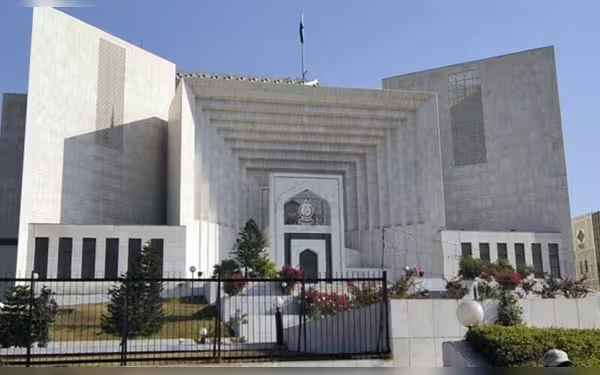Saturday, November 16, 2024 05:55 PM
Supreme Court Jurisdiction Dispute Over National Logistics Cell Case
- Jurisdictional dispute over NLC's constitutional interpretation arises.
- NLC insists on a constitutional bench for case hearing.
- FST's classification of NLC employees as civil servants contested.
 Image Credits: dawn
Image Credits: dawnA jurisdictional dispute at the Supreme Court of Pakistan involves the National Logistics Cell's constitutional interpretation and employee status.
In a significant development at the Supreme Court of Pakistan, a jurisdictional dispute has arisen concerning the interpretation of constitutional provisions related to the National Logistics Cell (NLC). This issue came to light when the NLC, which operates under the General Headquarters (GHQ), filed an application following a decision reserved by a two-member bench led by Justice Mansoor Ali Shah. The bench was deliberating on 50 petitions challenging the management decisions of the NLC.
The crux of the matter lies in whether the case should be heard by a constitutional bench or a regular bench. The Director General of NLC argued that the case involves crucial constitutional interpretations, specifically regarding Articles 240, 260, and 212 of the Constitution of Pakistan. However, the bench dismissed the objection raised by the NLC's counsel, Advocate Raja Saifur Rehman, stating that the matter did not warrant such a hearing.
Advocate Rehman contended that the case required a thorough interpretation of several constitutional provisions, particularly since the Federal Service Tribunal (FST) had previously granted civil servant status to NLC employees. This decision has been contested by the NLC, which claims that the FST's ruling was flawed and did not adequately consider the relevant constitutional articles.
In its application to the Supreme Court, the NLC emphasized that the interpretation of the aforementioned articles is essential to determine the status of its employees. The application stated, "by way of this application, the petitioner department wants to bring fact into the knowledge of concerned branch that since interpretation of Articles 240, 260 and 212 of the Constitution of Pakistan was involved in these cases; therefore, the cases were to be fixed before the constitutional bench." This highlights the NLC's insistence on the need for a constitutional bench to address the complexities of the case.
Furthermore, the NLC's application pointed out that the FST had incorrectly classified its employees as civil servants without considering Articles 240 and 242. It argued that a substantial question of law regarding the interpretation of these constitutional provisions must be resolved to ascertain the true status of the employees.
The application also referenced the recent 26th Amendment, asserting that all pending appeals before the Supreme Court should be transferred to a constitutional bench as per Article 191-A (4). This amendment aims to streamline the process and ensure that cases requiring constitutional interpretation are handled appropriately.
In light of these developments, the NLC has requested that the Supreme Court refrain from announcing a final judgment until the matter is reheard by a constitutional bench. This request underscores the importance of a thorough examination of the legal principles involved, as the outcome could have significant implications for the status of NLC employees and the interpretation of constitutional law in Pakistan.
As this case unfolds, it serves as a reminder of the intricate relationship between administrative decisions and constitutional law. The Supreme Court's eventual ruling will not only impact the NLC but may also set a precedent for similar cases in the future, highlighting the critical role of the judiciary in interpreting the Constitution and safeguarding the rights of employees across various sectors.













